Sorry about the wait, deadlines and life got in the way. I like “Cecilia”, who wanted to go either to Pompeii (and hope the volcano hadn’t already erupted!) or Queen Victoria.
Cecilia, please email CE on …
cemurphyauthor(at)gmail(dot)com
.
Sorry about the wait, deadlines and life got in the way. I like “Cecilia”, who wanted to go either to Pompeii (and hope the volcano hadn’t already erupted!) or Queen Victoria.
Cecilia, please email CE on …
cemurphyauthor(at)gmail(dot)com
.
Filed under Book Giveaway, Dark Urban Fantasy, Female Fantasy Authors
As the next of my series featuring fantastic female fantasy authors (see disclaimer) I’ve invited the talented and perceptive Glenda Larke to drop by.
Watch out for the give-away question at the end of the interview.
Q: You come from Western Australia originally. That’s a long way culturally from Malaysia where you now live. As a child growing up, did you long for something different?
Yes and no. I was a farm kid and I loved – and still love – the Australian landscape. But I made up my mind very young that I was going to travel – a lot. It was more just wanting to get out there and have a look: I never dreamed that life would conspire to keep me away so long. But I am coming back, for good, next year. It’s time!
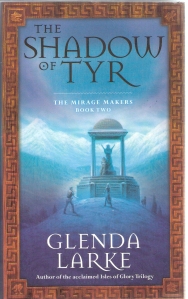 Q: You are in involved in rain forest conservation and you post some wonderful photos on your blog. Do you find aspects of this come through in your writing?
Q: You are in involved in rain forest conservation and you post some wonderful photos on your blog. Do you find aspects of this come through in your writing?
Well, my desert transport was inspired by the unlikely example of rainforest millipedes! Every book has a hundred different ideas and they are often inspired by my travels, not just in the rainforest. An understanding of ecology, of how things fit together and are reliant on one another, is an excellent guide to world-building.
 Q: Your first series was The Isle of Glory. I remember stumbling across your first book, The Aware and being blown away by your fresh voice. Do you think you will be exploring this world again?
Q: Your first series was The Isle of Glory. I remember stumbling across your first book, The Aware and being blown away by your fresh voice. Do you think you will be exploring this world again?
Probably not. I find that after three books I want to do something new: new magic, new characters, new world. I reckon if I start something brand new, then my writing stays fresh and I feel rejuvenated.
Although I’m not going back to the Isles of Glory, I am visiting another island archipelago in the trilogy I have just started to write. The middle book will be set on a tropical island. With spices and buccaneers and birds of paradise and general skulduggery. I have not managed to sell it yet, though…
And I am keen to go back to the Havenstar world – because I only ever wrote one book in that world! There’s room for more.
Q: I discovered The Mirage Makers when I was doing my Masters. It was particularly good timing as I was looking for books that explored the theme of discrimination. Do you consciously set out to explore themes, or do they creep up on you while you’re writing?
 I’ve had it happen both ways. With The Mirage Makers the theme started as a combination of the Disappeared Ones of Argentina – when parents were murdered and the children adopted by the murderers and brought up to despise their parents’ politics – and the lost generation of Australian children, where Aboriginal children were forcibly removed from both their parents and their culture. So that was very deliberate, right from the beginning.
I’ve had it happen both ways. With The Mirage Makers the theme started as a combination of the Disappeared Ones of Argentina – when parents were murdered and the children adopted by the murderers and brought up to despise their parents’ politics – and the lost generation of Australian children, where Aboriginal children were forcibly removed from both their parents and their culture. So that was very deliberate, right from the beginning.
In The Isles of Glory, I set out to write a fantasy adventure, but themes crept in along the way.
Q: Your most recent trilogy is Watergivers. Like you, I can remember a time when our water came from a water tank. And we were only allowed an inch of brown water in the bath to wash. This trilogy sounds wonderful. ‘Ancient water tunnels, moving red dunes, singing sands, salt pans, settlements in dry water courses, waterpaintings, precious water.’ Do you find your books grow organically, or do you plan them?
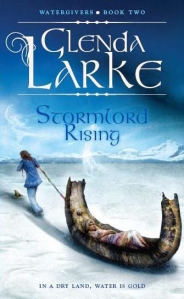 Both. If I write a synopsis, then I often end up changing it substantially as I go along, especially by the time I get to book three. I keep on having better ideas! However, I think it is essential to know where you are going. If you don’t have an ending in mind, how can you push the story forward?
Both. If I write a synopsis, then I often end up changing it substantially as I go along, especially by the time I get to book three. I keep on having better ideas! However, I think it is essential to know where you are going. If you don’t have an ending in mind, how can you push the story forward?
Q: I was prompted to start this series of interviews because there seems to be a perception in the US and the UK that fantasy is a bit of a boy’s club. Do you think there’s a difference in the way males and females write fantasy?
I do actually, although the moment you say something like that, someone else will find twenty different exceptions to the rule! However, let me take the plunge. I can’t imagine anyone but a male writer penning something like Joe Abercrombie’s The Blade Itself and the subsequent books set in that world. The level of violence and gore, the number and detail of the battles: it shrieks male author to me.
Women also write such scenes, but I think there is a subtle difference. In real life women tend to see victims as much as heroes when it comes to wars and fighting. And in fiction, the people who die are seen as more than just a body count to many (most?) female authors. Battle scenes written by a women always seem … sadder, more wrenching, and therefore less heroic, to me.
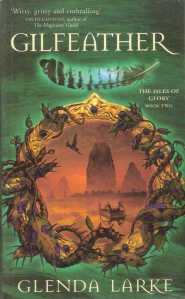 Women authors write epic fantasy just as well as men, but often differently, presenting more of the intimate and less of the big picture. Some male writers do this too, of course. In fact I’d say they do it more often than women write the more masculine heroic-scale story.
Women authors write epic fantasy just as well as men, but often differently, presenting more of the intimate and less of the big picture. Some male writers do this too, of course. In fact I’d say they do it more often than women write the more masculine heroic-scale story.
Have I said enough to earn myself a roasting in the comments yet?
Q: Following on from that, does the gender of the writer change your expectations when you pick up their book?
I think it does. And occasionally, of course, I am surprised. I’ve always been happy to read writers from any position along the gender spectrum, and it shocked me senseless when I was told that there were men who wouldn’t read women authors. I found it hard to believe that such extraordinary people existed. (I’m not kidding – I was absolutely astonished that there were men who happily wiped out half the human race from their reading. I guess I was once very naïve.)
Q: And here’s the fun question. If you could book a trip on a time machine, 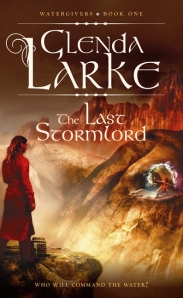 where and when would you go, and why?
where and when would you go, and why?
One thing for sure, I’d never go too far into the future. I don’t want to know. And what if you transferred to 2100, for example – and the world had been wiped out by an asteroid in the meantime? And anyone who wants to go back in time ought to read Connie Willis to see all the things that can go wrong… Nah, no thanks.
Give-away Question:
What kind of fantasy (e.g. epic world-scale, rollicking adventure escapism, urban paranormal, romantic, historical, Havenstar world…) would you like me to write next and why?
Follow Glenda on Twitter: @glendalarke
See Glenda’s Blog.
Find Glenda on GoodReads.
Find Glenda on Facebook.
I think Lexie’s answer, where she vividly describes the advantage to being human in form – she won me over with that one! Being in the US isn’t a disadvantage. Shaun’s comment about the prejudice against women writers struck such a chord – it’s a big talking point right now – look at your own choice to honour the Russ pledge with this blog! I really liked Mary’s answer as well – she’s content to be what she is – and I’d like to give her a copy as well. So two winners – Lexie and Mary. And I’ll talk to my publicist about getting a review copy for Sean’s blog!
So email Kylie on kylie(at)kyliechan(dot)com to organise this.
Filed under Book Giveaway, Fantasy books, Female Fantasy Authors, Fun Stuff, Genre
 While at Supanova in Sydney on the weekend I was seated next to Jennifer and I managed to pin her down about the give-away. (She’s had the last couple of months from hell with earthquakes and a deadline).
While at Supanova in Sydney on the weekend I was seated next to Jennifer and I managed to pin her down about the give-away. (She’s had the last couple of months from hell with earthquakes and a deadline).
So Jennifer said to announce Mark Yannalunas as the winner. Mark, if you email me <rowena(at)corydaniells(dot)come> I’ll pass your email along to Jennifer and she can organise your book for you.
Meanwhile, I happen to know that Jennifer’s next book will contain Ninja Fairies! So there’s a thought to conjure with!
As the next of my series featuring fantastic female fantasy authors (see disclaimer) I’ve invited the talented Kylie Chan to drop by.
Watch out for the give-away question at the end of the interview.
Q: Your first book White Tiger came out in 2006. Your books have been on the best seller lists consistently since then. Why do you think they appeal so much to your readers?
 Mainly, I think, because of the novelty. The Chinese mythology is a completely new set of stories to explore, with wonderful – and truly weird – characters. Many people have heard of the Monkey King but the overall philosophy and the way it fits together is fascinating. I’ve also tried to make the books a simple, straightforward and action-packed read, always fresh and never boring. It seems to have worked!
Mainly, I think, because of the novelty. The Chinese mythology is a completely new set of stories to explore, with wonderful – and truly weird – characters. Many people have heard of the Monkey King but the overall philosophy and the way it fits together is fascinating. I’ve also tried to make the books a simple, straightforward and action-packed read, always fresh and never boring. It seems to have worked!
Q: There were three books in the Dark Heavens series, White Tiger
Red Phoenix, Blue Dragon’, and another three in the Journey to Wudang sequel series, Earth to Hell, Hell to Heaven, Heaven to Wudang. When do you sleep?
What is this ‘sleep’ that you speak of? I am a mother. We learn the minute our first child is born that sleep is something that is precious and fleeting and truly wonderful. It doesn’t help my quest for sleep that I work best between midnight and three am – I tried to force-write book four, ‘Earth To Hell’, during the day and failed miserably – and that I have to get up at seven to get my daughter off to school. Unsurprisingly I’m ferociously productive during school holidays, when I can stay up as late as I like and sleep the morning away. This is a good thing, as I detest mornings anyway.
Q: The second series open 8 years after the first series finishes. You’ve been writing these characters since 2004 (?) now. Do they become like old friends?
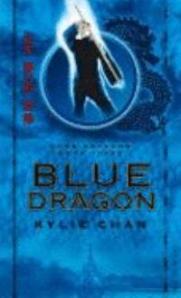 Yes, they have become like old friends. Is there a line you cross? From where the characters are talking to each other, to where they are talking to you, and the men in white coats come to take you away? Maybe to be successful as an author you have to pass that line anyway. I know many of my family and friends suffer me with bemused tolerance and believe that I should have been carted off to the madhouse a long time ago. But then they all show up at my house and it’s a madhouse anyway.
Yes, they have become like old friends. Is there a line you cross? From where the characters are talking to each other, to where they are talking to you, and the men in white coats come to take you away? Maybe to be successful as an author you have to pass that line anyway. I know many of my family and friends suffer me with bemused tolerance and believe that I should have been carted off to the madhouse a long time ago. But then they all show up at my house and it’s a madhouse anyway.
Q: In a post on the ROR site you talked about living in a different culture (you married a Chinese national and lived in Hong Kong for ten years) and how this gave you insight for your writing. Was it a bit of a culture shock to come back to Australia?
I can remember the first time I came back after being a while in Hong Kong – I was delighted at the signs. They were all in English! I was so accustomed to seeing signs in Chinese, or both languages, it was a cultural jolt.
Coming back for good has had some difficulties. There are a few really authentic provincial Chinese dishes that are simply not available here. I have an arrangement with the local Chinese restaurant to do one for me (steamed scallops on bean curd with black bean) but there’s no Chiu Chow Goose or Pepper Chicken here that’s really authentically well done. I miss the food!
 Q: I was prompted to start this series of interviews because there seems to be a perception in the US and the UK that fantasy is a bit of a boy’s club. Do you think there’s a difference in the way males and females write fantasy?
Q: I was prompted to start this series of interviews because there seems to be a perception in the US and the UK that fantasy is a bit of a boy’s club. Do you think there’s a difference in the way males and females write fantasy?
I’d really love to say no but that would be lying. Male-written fantasy, particularly when done by those who are new to the craft, tends to include female characters that are two-dimensional cardboard cut outs. After a while the writer becomes aware that all his women are depicted as round smiling cooks, graceful noblewomen or buxom peasants, and he’ll add a kick-ass man-hating Amazon in a chain-mail bikini – for the hero to win over.
Women writers do the same thing when they’re starting out, but in my opinion they tend to write more rounded characters – both male and female. For them, the female characters are depicted as more realistic people. It doesn’t stop novice women from writing characters that are just as two-dimensional.
When a writer is at the peak of their craft, however, gender makes no difference whatsoever. It’s impossible to tell the difference between truly great prose written by men or women, and the characters have made the transition from being sock puppets to being real people.
Q: Following on from that, does the gender of the writer change your expectations when you pick up their book?
 I’m ashamed to say that it does. I expect a book written by a man to be more plot-driven, and a book written by a woman to be more character-driven. This is a distressing revelation for me, I like to think I don’t pre-judge at all based on gender. Of course, since I like both types of novel, that’s the only expectation that I have; and whether it’s good or not is completely unrelated.
I’m ashamed to say that it does. I expect a book written by a man to be more plot-driven, and a book written by a woman to be more character-driven. This is a distressing revelation for me, I like to think I don’t pre-judge at all based on gender. Of course, since I like both types of novel, that’s the only expectation that I have; and whether it’s good or not is completely unrelated.
Q: And here’s the fun question. If you could book a trip on a time machine, where and when would you go, and why?
Only one trip? That is cruel beyond belief. The Roman Empire at its height – no wait, the Byzantine Empire at its height – no, classical Athens, when the Acropolis is being built – no, hold on, Renaissance Florence, can I go to Renaissance Venice at the same time? Renaissance Rome? China during the Qing! No, during the Tang. The Ming! Angkor Wat, when the city held a million people. No! The Incan civilization. Hold on, there’s all the future, too – Brisbane, a hundred years from now. Brisbane, a thousand years from now, and throw in the rest of the world while you’re at it. Oh, I give up, that question is way too hard. Just lend me the time machine, and I promise to bring it back in five minutes.
Give-away Question:
If you could be a Shen, would you be a human, a dragon, a stone, or some other sort of spirit, and why?
Follow Kylie on Twitter: @kyliecchan
Catch up with Kylie on her blog.
 Kaaron has a copy of The Walking Tree to give-away. She says:
Kaaron has a copy of The Walking Tree to give-away. She says:
Such inspiring responses! Part of the joy of book buying is the shared experience of a good read. Friends and I run the second hand book stall at our school fete, and we spend half the time recommending books we’ve found. One of my favourite days of the year.
I loved all the bookshop descriptions, but in the end chose Eleni, because I relate to her description of shelves that are not too high for short people!
Elini, please email Kaaron on kaaronwarren(at)hotmail(dot)com
As the next of my series featuring fantastic female fantasy authors (see disclaimer) I’ve invited the talented Kaaron Warren to drop by.
Watch out for the give-away question at the end of the interview.
Q: You lived in Fiji for three years. How did this come about? And do you find living in Fiji has influence your writing?
My husband was posted there as part of the diplomatic service, so we felt a bit ordinary when we came back! I was hugely influenced by Fiji in my writing; the environment, the people, the history, the culture, the shopping, the food, all of it was so different to life in Australia.
The thing is, coming back to Australia has inspired me as well. The stories I’ve written over the last 18 months have been hugely inspired by the Australian landscape. The rivers, the country towns, the suburbia and the winding roads you travel.
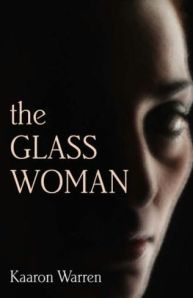 Q: I see you’ve sold around 70 short stories (three collections: The Grinding House, The Glass Woman, Dead Sea Fruit (coming soon from Ticonderoga Publications). Would you say the short story is your natural length? Or do you feel equally comfortable writing novel length?
Q: I see you’ve sold around 70 short stories (three collections: The Grinding House, The Glass Woman, Dead Sea Fruit (coming soon from Ticonderoga Publications). Would you say the short story is your natural length? Or do you feel equally comfortable writing novel length?
Both. Some stories are naturally short stories, others require far more exploration. I really love both things and love that I can write short and long.
Q: Your stories have been described as dark and disturbing. Are you a secret dark fiction (horror) fan? Does this mean you have the kind of dreams that make you wake up with vivid images and the echoes of a scream reverberating around in your head?
I love reading horror stories, but not the slash and burn kind. I also love the best crime stories, the ones that are full of horror.
I’m not such a fan of most horror movies.
I don’t have nightmares all that often; not the sleeping kind. My horrors come from hearing the news, reading the papers and magazines, from listening to the stories people tell, from watching my elderly neighbour be locked up against her will in a dementia ward.
 Q: Your mantle-piece must be getting very crowded with the swag of Ditmar and Aurealis Awards you’ve won, since way back in 1996. What do you think goes into an award winning story?
Q: Your mantle-piece must be getting very crowded with the swag of Ditmar and Aurealis Awards you’ve won, since way back in 1996. What do you think goes into an award winning story?
Originality of idea and voice. Sharpness and clarity. A real story. Characters you can believe in.
Q: You sold three dark fiction books to Angry Robot. That must have been a real buzz when the news came through. Slights appears to revolve around death and the afterlife. What inspired you to write this book?
It was an amazing moment, to read the email from Marc Gascoigne telling me he was buying all three novels. I had to ask my husband to read it, because I thought I was dreaming!
My concept of the afterlife in Slights is that you create your own hell by the way you behave on Earth. This was inspired very clearly by the Hare Krsna concept of hell; that your personal hell is designated by the things you do. If you are a drinker, or a meat eater, or a philanderer, a very certain hell awaits you.
 Q: Walking the Tree is your second book. Even after reading the blurb I find it hard to pin down the genre. What theme are you exploring with this book?
Q: Walking the Tree is your second book. Even after reading the blurb I find it hard to pin down the genre. What theme are you exploring with this book?
It’s quite an anthropological theme. I wanted to understand how much difference geography makes; how being born ten kilometres apart can make two people have very different lives.
I also explored the concept of the network; how everything connects.
Then there’s the idea of women in control; women the ones who leave. They are the ones who make the major life choices. I wanted to explore how this would affect people.
I also thought about the need to go home, the draw for home at the end of one’s life. I wondered what it would be like not to have this.
In doing this, I had to change my own perceptions. I had to understand that in the world of Botanica, leaving is important; saying goodbye is a natural thing.
Q: Your latest book is Mistification. It looks like dark urban fantasy. Can you tell us a little about it?
 It’s the story of Marvo, a true magician. He’s born in a strange room, in silence, and for the first four years of his life he doesn’t speak. He has no opportunity to go to school. Once he leaves this childhood home, he listens to stories, and he learns from all he knows from them.
It’s the story of Marvo, a true magician. He’s born in a strange room, in silence, and for the first four years of his life he doesn’t speak. He has no opportunity to go to school. Once he leaves this childhood home, he listens to stories, and he learns from all he knows from them.
I think Angry Robot would classify it in their category of WTF!
Q: I was prompted to start this series of interviews because there seems to be a perception in the US and the UK that fantasy is a bit of a boy’s club. Do you think there’s a difference in the way males and females write fantasy?
I’m not sure that there is. I don’t think I can pick a writer’s gender from their writing, unless they deliberately choose to write in a particular way.
Q: Following on from that, does the gender of the writer change your expectations when you pick up their book?
Not at all. I do read some books totally on spec, but most books are either by friends, or have come recommended, so I’m dealing with those expectations instead!
 Q: And here’s the fun question. If you could book a trip on a time machine, where and when would you go, and why?
Q: And here’s the fun question. If you could book a trip on a time machine, where and when would you go, and why?
I’d love to be able to solve a couple of long term murder cases! It would be hard to pick which one. I guess Jack the Ripper is a major one I’d love to know the answer to. But I’d also love to know what happened to the Beaumont Children, and to Eloise (another young girl who disappeared when I was about 7). I still have nightmares about all those kids, and feel such sorrow for the families not knowing.
Give-away Question:
What’s your favourite bricks and mortar bookshop?
Find Kaaron on GoodReads.
Follow Kaaron on Twitter: @KaaronWarren
Thanks everyone 🙂
Oh so hard to choose a winner! You all love the same books as me. I think I might have to with Brendan, because Susan Cooper and The is Rising means to much to me, too.
Brendan, email Kate to organise your prize.
kate (at)kateforsyth(dot)com(dot)au
As the next of my series featuring fantastic female fantasy authors (see disclaimer) I’ve invited the talented Nicole Murphy to drop by.
Watch out for the give-away question at the end of the interview.
Q: With your Asarlai trilogy there is a strong love story running through each of your books. Is this because you are a romantic at heart?
 Oh, absolutely. Big, soppy, kissy-kissy romantic. I’ll cry at romantic movies. I’ll sigh when the big proclamation of love scene comes. I think about Chandler proposing to Monica, or Lizzie finally accepting Darcy, and I just swoon.
Oh, absolutely. Big, soppy, kissy-kissy romantic. I’ll cry at romantic movies. I’ll sigh when the big proclamation of love scene comes. I think about Chandler proposing to Monica, or Lizzie finally accepting Darcy, and I just swoon.
When I started writing, I was trying my hand at epic fantasy and space opera. Then I realised that no matter what I attacked, it came with a strong romance subplot. So I decided to drop the rest of it and have a go at writing a fantasy romance. That was the original draft of Secret Ones.
Q: This trilogy strikes me as a modern take on Irish mythology. What attracted you to use this as a background for your world building.
Ireland came about because I couldn’t figure out how to use Australia. I’d decided the gadda were going to be a race that developed alongside humans but from different ancestors. I tried to make that ancestry Australian, but I couldn’t get my head around how to do that and not do something wrong to Indigenous mythology. So I tried another direction – humans originated in Africa. What’s the opposite of Africa? Answer – Ireland.
The great thing about this is because I’m not dealing with humans, I don’t necessarily have to be true to Irish mythology. The way I see it, the gadda are on the other side of the stories. They’d agree with some of the elements, but others from their point of view would be just plain wrong. So I’ve got the freedom to play within the mythology without having to be accurate.
Q: I hear you’ve put a proposal to your publisher for a new trilogy. Is it in the same world as the Gadda? Tell us a little about it.
It is in the same world as the Gadda. In fact, it’s the sequel to Dream of Asarlai. The new trilogy is called People of the Star and is set two years after Rogue Gadda. I’m taking the new world that’s resulted from the events of Rogue Gadda and really putting the guardians, their friends and family through the wringer.
It’s got the same structure as Dream of Asarlai, so there’s an overarching storyline but each book is a stand-along romance. You’ll be able to read People of the Star without having read Dream of Asarlai, although of course I’d prefer you to do both J
Cross fingers and toes for me that the publisher loves it and wants it too.
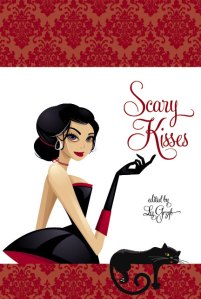 Q: I see you also have a story in Scary Kisses and More Scary Kisses. Did you start out writing short stories?
Q: I see you also have a story in Scary Kisses and More Scary Kisses. Did you start out writing short stories?
I was writing short stories and novels at the same time. I had more instant success with short stories – the first half a dozen stories I wrote I sold. This however twisted me a bit and while I recognised what I needed to learn with novels and worked hard on it, I kinda coasted with the shorts but as I aimed for better publications, the sales dried up.
Over the past twelve months, I’ve changed things around and started to work as hard on my short stories as I have on the novels and it’s starting to work. Apart from the two you mentioned, I’ve got a story in Issue 50 of Andromeda Spaceways, a flash piece in the upcoming Conflux Cookbook and hopefully there will be more sales this year.
I see shorts as a great way to challenge myself and experiment without having to sacrifice weeks or months to it. Learn in the shorts, apply to the novels .
 Q: You went to the Romantic Times Convention in Los Angeles. What was it like? If someone was going to go, what advice would you give?
Q: You went to the Romantic Times Convention in Los Angeles. What was it like? If someone was going to go, what advice would you give?
RT was fantastic! I had such a blast, I’m going to try to go again next year. RT is a convention much like our science fiction ones – panels during the day, social events at night. Except the romance community does things with a flair and bravado that would make a lot of SF people blush – and that’s not just the erotica writers J As RT isn’t just about romance nowadays but also covers fantasy, science fiction and mystery, it’s a great place to go to network with a large number of publishers, agents, writers and most importantly readers! And perhaps best of all – man will you score free books. I came home with twenty, and I stopped grabbing books cause I was worried about weight!
Q: It says in your bio that you were a teacher. Which subjects/ages did you teach and what are your best memories about being a teacher?
I taught primary school and over the nine years managed to cover everything from Kindergarten to Year Six. My favourite time was the three years I spent in Djarindjin/Lombadina, an Aboriginal community on the Dampier Peninsula in WA (north of Broome). It was fun, inspiring, awesome and a time I will never forget.
Q: You won an award for your series of article on mental illness. What prompted you to investigate this subject and what did you as a person take away from writing these articles?
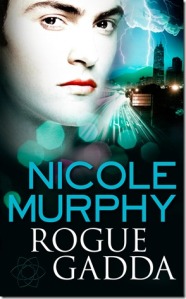 I started to work on it because mental illness is something that’s always interested me. A number of members of my family have had difficulties with their mental health and in fact, I’m currently dealing with depression myself.
I started to work on it because mental illness is something that’s always interested me. A number of members of my family have had difficulties with their mental health and in fact, I’m currently dealing with depression myself.
The thing I took away is that these are just people. It can be easy to be scared, particularly of some of the more severe conditions like bipolar or schizophrenia because some of the behaviour can be disturbing. But at the end of the day, they’re folks like you and me. They laugh. They cry. They struggle every single day with the impact of their illness and the smallest thing – a smile, a g’day, a nod – can make the world of difference.
Q: I was prompted to start this series of interviews because there seems to be a perception in the US and the UK that fantasy is a bit of a boy’s club. Do you think there’s a difference in the way males and females write fantasy?
I do. Not that I think that one is better than the other and of course there are exceptions, but my experience is that women’s books are different to men’s. I think we’re still in an age where socialisation does impact on the life experiences of men versus women, and that inevitably has an impact on the writing. Maybe not necessarily on the content, but on the tone and the understanding of societal privilege and what perspectives of the content are shown.
I’d love to see an experiment where a range of men and women were told to write the same scene, with the same character outlines and restrictions, and see what happens. Each one would be different, because people are different, but I think you’d find that the women’s writing would reflect a group opinion different to that of the men.
Q: Following on from that, does the gender of the writer change your expectations when you pick up their book?
Absolutely. Does that mean I read one more than the other? Well, at the moment I’m tending to read most within the genre of romance, and particularly paranormals. So I am reading more women than men, because more women write in that genre. Does that mean men can’t? Of course not – Trent Jamieson is writing a fabulous urban fantasy series at the moment.
 Q: And here’s the fun question. If you could book a trip on a time machine, where and when would you go, and why?
Q: And here’s the fun question. If you could book a trip on a time machine, where and when would you go, and why?
That’s such a hard question. There’s so many time periods that I love. But I’ve decided on a really personal one – I’d go back to after Worldcon last year and make some changes to my life that I’m sure would ward off the depression.
Nicole has kindly offered a copy of one of her books (you decide). Give-away Question:
Would you want to have magical powers? What would you do with them.
Follow Nicole on Twitter: @nicole_r_murphy